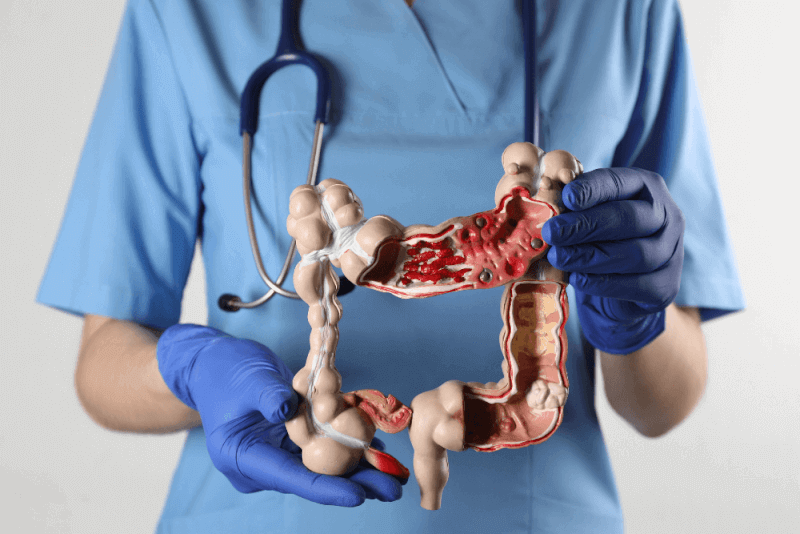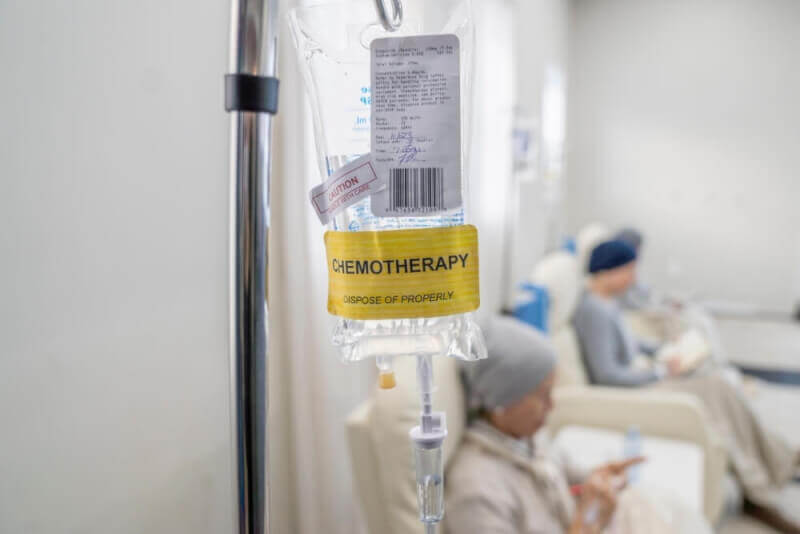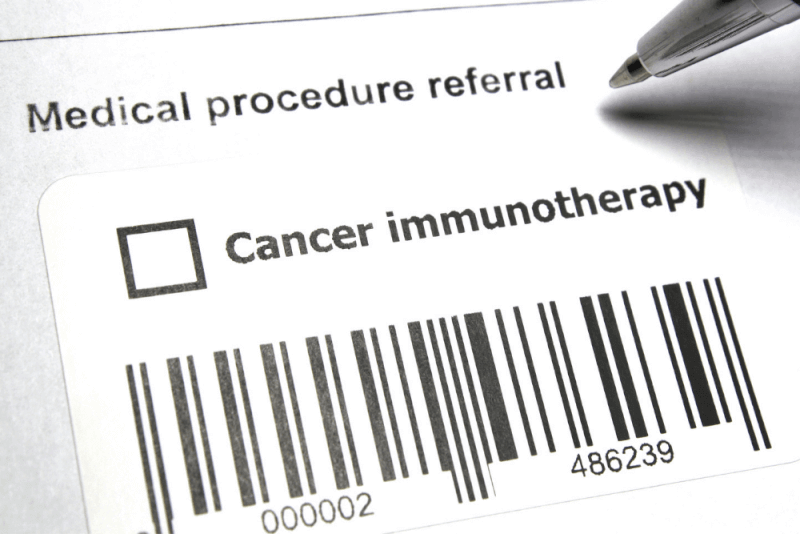What is Rectal Cancer?
Rectal cancer is the uncontrolled growth of cells in the rectum, the final part of the large intestine. The rectum is the area between the anus and the colon. This section of the large intestine is the last stage of digestion where stool is stored before being expelled through the anus.
Rectal Cancer Diagnosis
Early diagnosis of rectal cancer is very important. If there is a family history of cancer, routine screening tests should start at age 40. Diagnosis can also be made based on symptoms and complaints. Two methods are usually applied in the diagnosis of rectal cancer:
- Colonoscopy: A tube with a light and camera is inserted through the anus to visualize the colon and rectum, allowing for observation of any problems in the large intestine.
- Biopsy: If a suspicious area is seen during a colonoscopy, a biopsy sample is taken and sent to the laboratory to determine if it is cancerous.
- Imaging techniques like CT and MRI are used to check for cancer spread.
- PET scans are used to identify which tissues are affected by cancerous cells.
Symptoms of Rectal Cancer
Symptoms of rectal cancer can vary from person to person. In some cases, the disease shows no symptoms, while in others, symptoms are noticed, leading to a diagnosis. Some common symptoms of rectal cancer include:
- Bleeding from the rectum
- Constipation
- Diarrhea
- Incomplete evacuation of stool
- Gas pains
- Abdominal pain
- Nausea
- Vomiting
- Weight loss
- Fatigue
- Anemia
- Pain in the hip bone
Causes of Rectal Cancer
- If there is a family history of rectal cancer, the individual is at risk and should start routine screenings at age 40. If multiple family members have had rectal cancer, the likelihood of developing it is higher due to genetic predisposition.
- Rectal cancer can develop from polyps found in the large intestine.
- Familial adenomatous polyposis (FAP) is a rare condition causing thousands of polyps in the rectum and colon. Untreated FAP significantly increases the risk of rectal cancer.
- Lynch Syndrome is a cause of rectal cancer.
- Individuals with inflammatory bowel disease should have regular check-ups. Untreated inflammatory bowel diseases can lead to rectal cancer.
- High consumption of red meat and fatty foods increases the risk of rectal cancer.
- Smoking and alcohol consumption.
- Patients who have had colon cancer are also at risk of developing rectal cancer.
Treatment of Rectal Cancer
Surgery is the most common treatment for rectal cancer. The goal of rectal cancer surgery is to remove the tumor and affected lymph nodes. To enhance the effectiveness of the surgery, treatments like radiotherapy and chemotherapy are often applied beforehand.
Today, immunotherapy is also used to stimulate the patient's immune system to fight the cancer. Immunotherapy is usually applied in advanced rectal cancer cases. Early diagnosis is crucial for all types of cancer, including rectal cancer. Therefore, individuals at risk should start routine screenings at age 40, and those not at risk should begin at age 50.
Rectal Cancer Surgery
Surgery is one of the most preferred treatment methods for rectal cancer. The size and location of the tumor are very important when planning rectal cancer surgery. Some rectal cancer surgeries may require the removal of the anus, while in other cases, anus-sparing surgery can be performed.
Methods of Rectal Cancer Surgery
Different surgical methods are preferred in rectal cancer surgery depending on which tissues are affected, the size of the tumor, and its location.
- Coloanal anastomosis
- End colostomy
- Local excision
- Transanal excision
- Low anterior re section
- Intraoperative radiation therapy
- Polypectomy
- Radiofrequency ablation
Benefits of Rectal Cancer Surgery
After rectal cancer surgery, the tumor tissue is removed, and the disease is regressed. In some patients, regional lymph nodes are also removed to prevent the spread of the disease. The goal is to enable the patient to return to daily life after completing the necessary post-surgery treatments.
Complications of Rectal Cancer Surgery
- Leakage of stool into the abdominal cavity due to bowel reattachment after surgery.
- Increased bowel movements or incontinence may occur, which usually resolves after a while post-surgery.
- Infection at the surgical wound site.
- Frequent and urgent need to defecate.
- Urinary tract infections and difficulty urinating.
- Sexual problems due to nerve damage during surgery.
- Bowel adhesions.
Post-Surgery Life for Rectal Cancer
After rectal cancer surgery, the patient must go for regular check-ups and follow-ups. During these follow-ups, the patient is evaluated using specific laboratory and imaging methods. Post-surgery, the patient should rest adequately and pay attention to their diet.
Patients who have undergone rectal cancer surgery should consume easily digestible and soft foods. They should eat smaller portions and avoid spicy and hot foods. Post-surgery, foods such as meat products, fresh fruits, packaged foods, and raw vegetables should be avoided.
Recovery Process of Rectal Cancer
After a rectal cancer diagnosis, the appropriate treatment process determined by the doctor begins. Although the recovery process varies from person to person, the recovery rate is particularly high for early-diagnosed rectal cancer.
Treatments like surgery, chemotherapy, and radiotherapy are arranged according to the doctor’s treatment plan and can vary based on the stage of the disease. Patients in the recovery process should comply with the prescribed treatments and carefully follow the necessary protocols.
Risks of Rectal Cancer
Like other types of cancer, rectal cancer is a serious health problem and can pose life-threatening risks if left untreated. Early diagnosis is crucial for rectal cancer, as it is for any disease, and the recovery rate is high when detected and treated early.
Rectal cancer can spread to nearby tissues or regional lymph nodes, then to the bowel wall, abdominal cavity, and other organs, posing significant risks. Rectal cancer carries various risks, including bowel movement problems, intestinal issues, and cancer spread to other areas.
Precautions for Individuals with Rectal Cancer
- Pay attention to weight control.
- Do not miss routine screenings.
- Quit alcohol and smoking.
- Avoid red meat, fatty foods, packaged foods, sugary foods, and raw foods.
- Consume healthy vegetables, fiber-rich fruits, and legumes.
- Eat frequently in small portions.
- Pay attention to water intake.
Stages of Rectal Cancer
Staging of rectal cancer is important for proper treatment application. Knowing the stage of rectal cancer provides information on how fast the cancer is growing and its likelihood of metastasizing. The staging of rectal cancer varies based on tests performed, the location of the cancer in the rectum, and the size of the tumor.
Stage 1
In stage 1, rectal cancer has spread to the bowel wall or the muscle layer of the rectum but has not spread to other areas.
Stage 1 Symptoms
- Mucus in stool
- Excessive gas
- Diarrhea
- Constipation
- Rectal bleeding
Stage 2
- In stage 2, cancer cells have spread through all layers of the rectum, from the inner layer to the outer layer. There is no spread to regional lymph nodes yet.
Stage 2 Symptoms
- Changes in bowel movements
- Blood in stool
- Abdominal pain
- Nausea and vomiting
Stage 3
In stage 3, cancer cells in the rectum have started to spread to the neighboring lymph nodes.
Stage 3 Symptoms
- Incomplete evacuation of stool
- Feeling of a lump in the abdomen
- Iron deficiency anemia
- Difficulty in defecating
- Weight loss
Stage 4
Stage 4 is the final stage of rectal cancer. Metastasis occurs in lymph nodes, large intestine, abdominal cavity, liver, lungs, and bones.
Stage 4 Symptoms
- Pain in the hip bone
- Loss of appetite
- Fatigue
- Thinning of the stool
- Blood in the stool
- Dysfunction of affected organs
- Multiple organ failure







